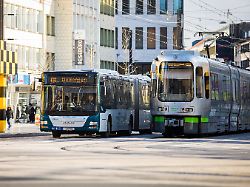In the ongoing collective bargaining for local transport, employees are fighting primarily for better working conditions. But these are not the only things that are challenging compared to other professions. Salaries also have room for improvement.
After 29 years of working in Dortmund, bus driver Claudio Kleine reports of increasing hostility at work, increased time pressure – not even a restful bathroom break is possible – and the strain on health and family caused by three-shift work 365 days a year. Nevertheless, the pay is poor and colleagues often have to apply for housing benefit, the Verdi member complains on the union’s homepage.
So it’s no wonder that the Federal Statistical Office recently warned that bus and tram drivers are aging – local transport companies are running out of young people. “With us, a bus driver gets a starting salary of 2,646 euros gross,” said Kleine a year ago. “To do that he has to drive full time and then work on holidays and Sundays. Who wants that?”
This Friday, according to the collective agreement in North Rhine-Westphalia, the starting salary will rise to a good 3,000 euros plus supplements, and after three years of employment the salary will then increase to a good 3,140 euros. The highest wage level of almost 3,720 euros is reached after 17 years.
Stuttgart offers the highest salaries
The collective agreements differ depending on the federal state; according to the job portal Stepstone, the average salary of bus and train drivers was most recently 2,850 euros gross. The so-called median salary is more meaningful, which according to the employment agency was just under 3,180 euros in 2022 – half of the drivers earned less, half more. A quarter only received up to around 2,860 euros full-time, a quarter received a good 3,500 euros or more.
Baden-Württemberg stands out in a country comparison, with drivers there earning a median salary of almost 3,570 euros more than in the rest of the Federal Republic, and in Stuttgart it was even almost 3,780 euros. In Munich, which is also expensive, the average salary was far lower at 3,400 euros. Brandenburg brought up the rear in the country ranking with just under 2,780 euros.
For comparison: Across all industries, Stepstone calculated a median salary of around 3,670 euros per month for a full-time position in 2022. According to the Federal Statistical Office, the average salary of full-time employees in Germany was a good 4,100 euros in April of that year. Bus, subway and tram drivers therefore earn significantly less than other industries pay. Nationwide, one in four drivers has a foreign nationality – the proportion of all employed people overall is 14 percent.
“Incredible pressure on employees”
Passengers in Berlin, North Rhine-Westphalia, Hamburg, Lower Saxony, Saxony-Anhalt and Rhineland-Palatinate will have to switch to cars or bikes on Thursday and Friday because Verdi has called for two-day warning strikes. In some cases there are S-Bahn or regional buses that are not operated by municipal employers.
Bus and train drivers are stopping work in almost all of Germany this week. “We have a dramatic shortage of workers in public transport and incredible pressure on the employees,” explained Verdi deputy chairwoman Christine Behle. “Buses and trains are canceled every day in all tariff areas because there are not enough staff. Something urgently needs to be done to relieve the burden on employees.”
In the ongoing collective bargaining, the employee representatives are demanding, among other things, shorter working hours, more vacation and additional days of relief for shift work for the approximately 90,000 employees of the more than 130 municipal public transport companies. Wages are also being negotiated in Brandenburg, Saarland, Saxony-Anhalt and Thuringia. The strikes began at the beginning of the month and are expected to culminate this Friday, March 1st. Fridays for Future and associations have called for a “climate strike” on the same day.
